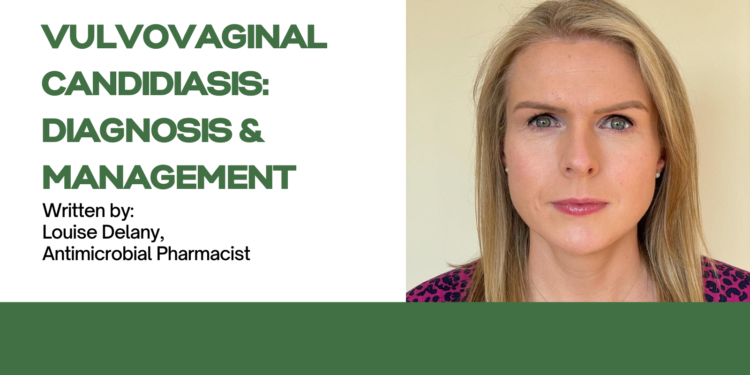Written by Louise Delany –Antimicrobial Pharmacist, The National Maternity Hospital Dublin
Introduction
Candidiasis is a fungal infection caused by yeasts that belong to the genus Candida Candida yeasts are present in low numbers on healthy skin in moist areas and are part of the normal flora of the mucous membranes of the respiratory, gastrointestinal and female genital tracts. Overgrowth of Candida species can cause infections. There are over 20 Candida species that can cause such infections in humans, Candida albicans is the most common and causes 80-89% of vulvovaginal candidiasis (VVC) infections in women. Candida glabrata causes the majority of remaining VVC infections. Approximately 75% of women will experience at least one VVC infection in their lifetime and between 40 and 45% will have two or more infections. Infections can occur without any specific precipitating factor, however there are some risk factors which are known to predispose a woman to VVC infections.
Known risk factors include;
• Poorly controlled diabetes mellitus.
• Use of broad-spectrum antibiotics. This is due to inhibition of normal bacterial flora, which allows for growth of Candida. VVC infections may occur up to 3 months after a course of antibiotics is taken.
• Increased oestrogen levels, especially during pregnancy (endogenous oestrogen) and with post-menopausal oestrogen therapy (exogenous oestrogen).
• Immunosuppression.
• Genetic factors.
VVC is uncommon in postmenopausal women, unless they are taking oestrogen therapy. It is also uncommon in prepubertal girls.
Clinical Features
VVC typically presents with vulval itch and a non-offensive vaginal discharge.
Other symptoms may include:
• Soreness or burning of the area
• Superficial dyspareunia
• Cyclical symptoms
Clinical signs may include:
• Erythema
• Fissuring
• Swelling/ oedema
• Vaginal discharge typically non-offensive and curdy but may be thick
• There may also be satellite lesions and excoriation marks
Diagnosis
VVC diagnosis is based on typical features of the infection being present, supported by laboratory confirmation of Candida species from a vaginal sample. It is good practice to support a diagnosis with routine microscopy for those presenting to secondary care with symptoms. Recurrent VVC is defined as four or more symptomatic episodes over a 12-month period; at least two of these episodes should be confirmed by microscopyor culture. Clinical examination of the external genitalia is recommended in women presenting with symptoms suggestive of acute VVC and examination should always be carried out for those presenting with recurrent VVC. Clinical examination should be used to exclude alternative or co-existing vulvovaginal pathologies.
A high vaginal swab should be carried out for microscopy and cultures should be carried out for samples taken from women with recurrent VVC. Resistance to antifungals is rare, however sensitivity testing should be done for those with recurrent VVC.
Table 1: Acute Infections
Acute vulvovaginal candidiasis in pregnancy
Clotrimazole 500mg pessary – PV at night (can give for up to 7 consecutive nights if required)*
Clotrimazole 200mg pessary – PV at night (can give for up to 7 consecutive nights if required)*
*Longer courses are recommended in pregnancy to achieve successful cure. Reviews have found that a four-day course will cure just over 50%, whereas a seven-day course cures over 90%.
Acute vulvovaginal candidiasis (not in pregnancy)
Fluconazole 150mg – PO STAT (not for use in pregnancy)
Clotrimazole 500mg pessary – PV STAT at night
Clotrimazole 200mg pessary – PV at night every 24 hours for 3 nights
Clotrimazole 10% internal vaginal cream 5g dose (one applicatorful to be inserted into the vagina at night)
Severe acute vulvovaginal candidiasis
Fluconazole 150mg PO on day 1 and day 4 (not for use in pregnancy)
Clotrimazole 500mg pessary PV at night on day 1 and day 4
Table 2: Recurrent Infections
Recurrent vulvovaginal candidiasis (pessary regime)
Induction
Clotrimazole 200mg pessary PV at night every 24 hours for 10-14 nights
Clotrimazole 500mg pessary PV at night every 24 hours for 7-14 nights
Followed by maintenance if required:
Clotrimazole 500mg pessary PV at night every week for 6 months
Recurrent vulvovaginal candidiasis (oral regime)
Induction
Fluconazole 150mg PO on day 1 and day 4 and day 7 (total 3 doses) (not for use in pregnancy)
Followed by maintenance if required:
Fluconazole 150mg PO weekly for up to 6 months
Management
Women with a diagnosis of VVC, should be advised to avoid using local irritants such as perfumed soaps or wipes, however, patients can be advised to use an emollient for personal hygiene as a soap substitute, as a moisturiser or as a barrier cream. Patients need to be aware that this is for use in the outer part of the genital area and not for internal use. For those with recurrent infections of VVC, clinicians should include a review of their daily hygiene routine to identify any potential irritants for example washing hair in bath water or excessive cleaning. Medication causes should be considered for patients presenting with symptoms of VVC; women recently started on oestrogen therapy or those that have received a recent course of antibiotics.
Treatment
Treatment of VVC is based on whether it is a first presentation, a recurrent infection and whether the patient is pregnant at the time of infection. The tables below are based on the treatment recommendations as per British Association for Sexual Health and HIV national guideline for the management of vulvovaginal candidiasis (2019). It should be noted that intravaginal and topical treatment can damage latex condoms and diaphragms; extra precautions are advised. During pregnancy the use of an applicator is not advised, and the pessary should be inserted without using an applicator. Oral fluconazole can interact with medications and a medication history should be taken before prescribing this as a treatment option. Topical therapies can cause vulvovaginal irritation, and this should be considered if symptoms worsen or persist. Fluconazole should be avoided if the woman is pregnant, however breastfeeding can be continued if only a single dose of 150mg fluconazole is administered.









